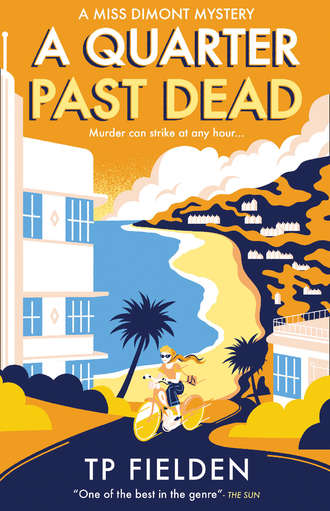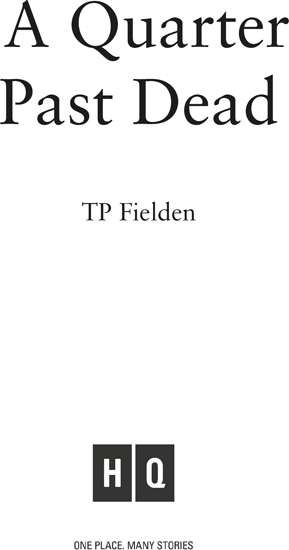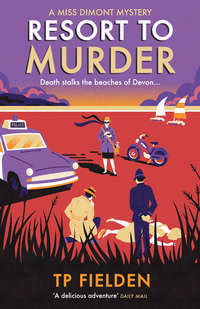
Полная версия
A Quarter Past Dead

TP FIELDEN is a leading author, broadcaster and journalist. This is the third novel in the Miss Dimont Mystery series.

Copyright

An imprint of HarperCollins Publishers Ltd
1 London Bridge Street
London SE1 9GF
First published in Great Britain by HQ in 2018
Copyright © TP Fielden 2018
TP Fielden asserts the moral right to be identified as the author of this work.
A catalogue record for this book is available from the British Library.
This novel is entirely a work of fiction. The names, characters and incidents portrayed in it are the work of the author’s imagination. Any resemblance to actual persons, living or dead, events or localities is entirely coincidental.
All rights reserved under International and Pan-American Copyright Conventions. By payment of the required fees, you have been granted the non-exclusive, non-transferable right to access and read the text of this e-book on-screen. No part of this text may be reproduced, transmitted, downloaded, decompiled, reverse engineered, or stored in or introduced into any information storage and retrieval system, in any form or by any means, whether electronic or mechanical, now known or hereinafter invented, without the express written permission of HarperCollins.
Ebook Edition © November 2018 ISBN: 9780008193799
Version: 2018-09-13
PRAISE FOR TP FIELDEN
‘Peak comfort read has been achieved’
Red
‘One of the best in the genre’
The Sun
‘This is a fabulously satisfying addition to the canon of vintage crime. No wonder the author has already been signed up to produce more adventures starring the indefatigable Miss Dimont’
Daily Express
‘Unashamedly cosy, with gentle humour and a pleasingly eccentric amateur sleuth, this solid old-fashioned whodunit is the first in what promises to be an entertaining series’
The Guardian
‘Highly amusing’
Evening Standard
‘TP Fielden is a fabulous new voice and his dignified, clever heroine is a compelling new character. This delicious adventure is the first of a series and I can’t wait for the next one’ Wendy Holden, Daily Mail
‘A golden age mystery’
Sunday Express
‘Tremendous fun’
The Independent
For
Bo Wilson
Of every creature’s best
Contents
Cover
About the Author
Title Page
Copyright
Praise
Dedication
ONE
TWO
THREE
FOUR
FIVE
SIX
SEVEN
EIGHT
NINE
TEN
ELEVEN
TWELVE
THIRTEEN
FOURTEEN
FIFTEEN
SIXTEEN
SEVENTEEN
EIGHTEEN
NINETEEN
TWENTY
TWENTY-ONE
TWENTY-TWO
TWENTY-THREE
TWENTY-FOUR
TWENTY-FIVE
TWENTY-SIX
TWENTY-SEVEN
Extract
About the Publisher
ONE
The trouble with Betty was she could never say no.
‘Oh, Betty,’ sighed Miss Dimont, looking over her Remington Quiet-Riter and pushing the spectacles back up her nose. ‘Who was it this time?’
‘Dudley Fensome.’ Betty was sobbing into a creased handkerchief and was clearly not going to do much reporting this morning.
‘But you know his reputation,’ said Miss Dimont, who’d met the brute at the Constitutional Club. ‘And a Freemason as well – what were you thinking of?’
‘He said he wanted it that way and I did it to please him.’
‘Surely not!’
‘He made me.’
‘It’s a woman’s right to decide for herself!’
‘You don’t know what it’s like when they ask.’
You’re right, thought Miss Dimont, I don’t. The chief reporter pushed her notebook aside and got up to make the tea.
‘I don’t know, Betty,’ she said, ‘there was Derek. Then Claud Hannaford in that revolting pink Rolls-Royce – now Dudley Fensome. All in the last few weeks. None of them seems to show you any respect.’
‘I know,’ wailed Betty, ‘sometimes I’m just like putty in their hands…’ Not just sometimes, thought Miss D. But it was true – the burning desire of a bachelor Freemason had got the better of Betty. It might have been better if she’d got a professional to take care of the problem straight away, but Betty had to go and do it herself.
She looked wretched.
‘Platinum’s not so bad,’ said Miss Dimont finally, looking down at the disaster from above, teapot in hand. ‘There are a couple of green patches over your ears, granted, but I’ve got that nice crochet hat the Mothers’ Union gave me last winter – you can have that.’
Betty Featherstone wailed even louder.
Nobody else in the newsroom of the Riviera Express took much notice. It was press day, the usual hubbub of a busy newsroom augmented by the occasional bellow of anguish from the editor’s office. Rudyard Rhys may once have been a naval officer, but these days he was not entirely the captain of his own ship.
‘No, no, no!’ his voice echoed out of the door, sounding as agitated as if he were trying to avoid an iceberg. ‘Not Sam Brough again, I simply won’t have it!’
‘The first mayor of Temple Regis to go to Buckingham Palace,’ argued Peter Pomeroy, his deputy, perfectly reasonably, ‘to be made a Member of the Order of the British Empire. That’s a feather in the town’s cap. The readers will expect a good show on that.’
‘You mean His Worship will. Page Seven,’ said Mr Rhys dismissively, who hated Brough and his snobbish wife. He may dither about what to put on his front page, but when it came to pushy self-aggrandising town officials the editor’s decision was final.
‘There’s always Bobby Bunton,’ said Miss Dimont, who’d put her head round the door to see what the fuss was about. ‘By the way, Betty’s going to take the rest of the day off, d’you mind?’
‘Rr… rrrr,’ growled the editor, shuffling the page proofs in front of him.
‘Bunton,’ said Miss Dimont, who knew how to get a decision out of her procrastinating leader. ‘He’s in murderous mood.’
‘Sounds good to me,’ said Peter, whose responsibility it was to make sure the paper went to bed on time, and by now didn’t care much what was on Page One as long as the story fitted the gaping hole in the page.
‘Remind me,’ sighed Mr Rhys, swivelling in his chair and eyeing the seagulls circling like vultures outside his window. One of these days he’d walk out on press day and never come back. That would show them.
‘It’s the latest round in his battle with Hugh Radipole. Bunton brought in a new funfair attraction and now Mr Radipole has banned him from the Marine Hotel. It’s all-out war!’
‘Rr… rrr,’ replied Rhys and did what he always did at times of indecision. It could take a good three or four minutes for him to clean out his filthy briar pipe and load it with tobacco – precious minutes, with the newsroom clock ticking towards deadline.
Peter Pomeroy nodded urgently to Miss Dimont. ‘Do it,’ he said. ‘Four hundred words.’
‘It’s written,’ said Miss Dimont cheerily. ‘And Betty?’
‘Yes,’ nodded Peter understandingly. He’d clocked the disaster on top of her head.
‘Just don’t sensationalise it,’ said Rhys anxiously. ‘We don’t want Fleet Street picking up the story and making a mockery of this town. Bunton may be a well-known figure, but he’s hardly representative of the virtues of Temple Regis – I don’t want outsiders thinking we’re Blackpool.’
Heaven forbid, thought Miss Dimont as she whisked back to her desk. Demure, discreet, desirable – these were the watchwords which attached to any story describing their adorable town. If it wanted to get into the Riviera Express.
In truth Temple Regis was all of those d-words. What’s more it was the prettiest town in Devon; people always said that. From the palm trees which welcomed you on the railway station platform to the winding narrow streets with their interesting shops to the soothing ice-creams, the donkey-rides on the broad and beautiful beach, and the never-ending sunshine – nothing could be nearer paradise.
In the late 1950s, with the nation back on its feet at last, it was the ideal place for people to come on holiday – but Rudyard Rhys wanted to make sure only the right people came.
Indeed, the two people his chief reporter had just mentioned somehow summed up what was both right and wrong about the place. Hugh Radipole had bought the Marine Hotel after the war, put a not inconsiderable amount of money into refurbishing it, and to its smooth Art Deco halls welcomed some of the most distinguished people in the land. Their presence added tone and culture to the town.
But then somehow someone had allowed Bobby Bunton in, and with him he’d dragged the knotted-handkerchief brigade. The wrong people.
If that wasn’t bad enough Bunton also brought with him Fluffles Janetti, that well-known courtesan whose shapely form was never far from a headline and whose pot-pourri of a love life kept the Sunday newspapers very busy indeed. She loved the bar in the Marine, though apparently it no longer loved her, despite her impressive consumption of its many liquid offerings. There’d been a bit of a dust-up, with bottles smashed and a quantity of blood spilt.
NEIGHBOURHOOD DISPUTE OVER FUN FAIR RIDE
by Judy Dimont, Chief Reporter
ran the headline.
Police were called after a dispute at the Marine Hotel ended in violence on Tuesday night.
The well-known entrepreneur Bobby Bunton, owner of the Buntorama Holiday Camp, has demanded an apology after he was requested to leave the building. He and a companion have threatened to sue the management of the Marine. Mr Bunton says he had been enjoying a quiet drink in the Primrose Bar when he was suddenly asked to leave the premises and not return. His companion’s garments were torn and disarranged.
‘I take this as a personal insult,’ said Mr Bunton. ‘I can think of no reason why I should be subjected to such vile treatment.’
A spokesman for the Marine Hotel declined to comment.
Buntorama, the fifth in Mr Bunton’s nationwide chain of holiday camps, opened last year on the site of the old Ruggleswick army camp. The camp is situated on land abutting the grounds of the Marine Hotel and there have been reports of disputes between the two companies running the businesses.
Since establishing Buntorama in 1948 Mr Bunton claims to have provided cheap holidays for over eight million people and has become a familiar figure on radio and television.
‘People are entitled to have fun,’ he told the Express, ‘whatever they earn. My guests mean a great deal to me and I don’t see why (continued on p 3)
Wary of infuriating her editor further by putting in the bit about Fluffles losing her clothes, Miss Dimont put the story back in her Quiet-Riter and xxxx’d out this rather delicious detail. She also refrained from mentioning that Bobby Bunton had deliberately placed his new helter-skelter ride right next to the boundary of the Marine Hotel, so that shrieks and cries from his punters would shatter the calm and sobriety of the guests on the posher side of the fence.
‘All done,’ she said, handing over the copy-paper to Peter Pomeroy with a smile, and in that moment her face lit up until she looked quite beautiful. Peter often remarked to his wife how Judy could seem so plain one minute and so dazzling the next, and Mrs P agreed. They sometimes wondered why someone so worldly and so accomplished had come to Temple Regis to be a reporter on the local rag.
It remained an unanswered mystery.
Over in the darkroom Terry Eagleton was busy sloshing developer fluid into a tray, happy to be back in Temple Regis after a boring stint in the Plymouth head office. Sooner or later the images painstakingly captured from the top of a schooner’s mast would appear, as if through the fog, and he would hang them up to dry. He was tough, efficient, handsome, and occupied that parallel universe where photographers exist – linked to humanity, but not quite part of it.
‘I suppose it’s all that time you spend peering down a lens,’ Judy Dimont once observed as they sat in the Minor in the drumming rain, waiting for the Regis lifeboat to come in. ‘Separates you from the real world.’
‘If you want the real world,’ grunted Terry, who did not squander precious time pondering the human condition, ‘just look at my pictures. Pictures of real people doing real things.’
‘Very fine they are too, Terry,’ said Judy, and let the matter drop. Oil and water, water and oil – they’d worked together as a successful team for five years, yet neither could see inside the other’s head. She admired his courage and tenacity and undeniable skill with a camera, but couldn’t understand why he never read a book. Terry felt protective about Judy but when the editor called her ‘Miss Dim’ he could see what the old boy was getting at. She had a brilliant mind but was not altogether trustworthy in polite company.
After all, hadn’t there been that extraordinary incident at the Regis Conservative Party ball? Apologies were offered all round afterwards, and everybody pretended they’d forgotten it ever happened, but you’d never catch a photographer behaving like that!
Just then the maverick in question popped her head round the darkroom door. ‘All done for the week,’ she said.
‘My Buckingham Palace pic?’ said Terry, washing the developer off his hands under the cold tap.
‘Seven.’
‘Ridiculous. Should be on One – the readers’ll expect a good show on that. First Mayor of Temple Regis to get a gong!’
‘Don’t worry. Sam Brough will be wearing that medal everywhere, even on his pyjamas, I shouldn’t wonder. Word will soon get about he’s met the Queen, no need for the photographic evidence.’
Terry turned and looked disparagingly at Miss Dimont. She just didn’t get it – didn’t even try. The lighting in the Palace courtyard that day had been very tricky – up and down like a yo-yo – the trouble he’d had with his aperture!
‘Coming to the Fort?’
There was only one place in Temple Regis on an early Thursday evening if you had any connection with local newspapers and that was the Fortescue Arms, just round the corner from the Express offices and handily placed if you needed to be called back. As with all newspapers, things had a habit of going wrong at the last moment and there was an unwritten rule you did not stray far, even though your working day was over.
‘Don’t know,’ said Terry. He was cross about the MBE and wanted to blame Judy.
‘They’ve got cribbage tonight.’
‘Ur.’
The pair made their way down the stairs and out through the grand-looking front hall. Upstairs the newsroom looked its usual mess – paper strewn over the floor, glue pots everywhere, overflowing ashtrays and discarded cups of tea, the cleaners as usual having failed to take away the overnight mousetraps. But down here it looked as if they were expecting a visit from the Queen Mother herself – all polished wood, copies of Express front pages lining the walls in oak frames, and an impressive oil portrait of the newspaper’s founder above the fireplace.
Keeping guard over this shrine to the fourth estate was Joyce, the new girl who looked nice but irritatingly could never remember a single person’s name.
‘G’night, Terry!’
Well, thought Miss Dimont crossly, could never remember a person’s name – except Terry’s. The darling boy lingered, delighted to exchange a bit of banter, but Judy strode on.
Though it was still early the saloon bar of the Fort was crowded, mostly with muscular types in need of a shave and a new wardrobe. They smelt clean, though, and the racket they made was joyful: clinking and shouting and gurgling and laughing.
These ruffians were the reminder that Temple Regis was not just a holiday resort, but a fishing port too. And tonight the sailors, fishermen and ferrymen, Customs men and life-boatmen, were here in force, bringing an energy to the place which no crowd of summertime holidaymakers could ever match.
Across the bar Miss Dimont spotted the Viking-like skipper of the Lass O’Doune, Cran Conybeer, and waved. His beard tilted upward in salute and as he raised his glass to her he looked even more magnificent in his shaggy, unkempt way. There had been a moment when… but somehow nothing had come of it and the two were no more now than smiling acquaintances.
As she plonked down her raffia bag on a wet table Terry meandered through the door and instantly started droning on about some new high-speed film he was going to try out – really, his idea of conversation! Severely in need of an overhaul! Miss Dimont left him boring a couple of subeditors about Tri-X and push-processing while she made her way to the bar to order him a brown ale.
‘What you doin’ ’ere?’ said a familiar figure from the crew of the Lass. It was Old Jacky, a man for whom a day was wasted if he were not at sea. He must have been all of seventy-five.
‘Every Thursday,’ shouted Miss Dimont, gesticulating at the barman. ‘Press night. What are you lot doing here? Not your usual haunt.’
‘The William and Mary,’ replied Old Jacky, though he pronounced it ‘Willummaree’.
‘Oh yes,’ said Miss Dimont.
‘Fifty yars agoo nex Sa’day.’
It remained Temple Regis’ greatest tragedy, the loss of the lifeboat and a dozen souls who’d braved gale-force winds to save the crew of a merchant ship, grounded on the rocks beyond the point and breaking up in mountainous seas. What made the event such a bitter memory, even today, was that by the time the lifeboat reached its goal, the merchantmen had already been lifted off and were safe. They lived, while their saviours died.
‘We’ll be putting a big piece in the paper next week,’ promised Miss Dimont earnestly, though she had no idea whether Mr Rhys was even aware of the anniversary. But it was the sort of thing you always said to the public when it looked like you’d missed the most obvious story in town. She backed away quickly in case Old Jacky wanted more details, the brown ale and her ginger beer slopping gently over her shoes as she went.
When she got back to the far corner there were a handful of familiar faces but no Terry.
‘Where’d he go?’ she shouted to one of the sub-editors above the din.
‘Shot out back to the office. Someone came and told him to get up there in a hurry.’
‘Why?’ yelled Judy. ‘Too late to change any of the pictures now, the presses are rolling.’
‘No, it’s a story, I think. Someone found dead over at Buntorama – you know, the place where…’
‘I know the place!’ rasped Miss Dimont. ‘Why did he go without me?’
‘Dunno,’ said the sub, edging towards the door, more interested in getting home for Hancock’s Half Hour on the radio. They worked in newspapers, these people, thought Miss D – but would they know a story if they tripped over one on the promenade?
‘Here,’ she said, brusquely, ‘drink these!’ and pushing her way back out of the door, she was just in time to see Terry behind the wheel of the Minor, gunning the motor while impatiently waiting for a couple of pedestrians to get out of his way.
‘Terry!’ she shouted, but the office car veered away, the photographer bent forward with a look of steely determination on his face.
Just then Peter Pomeroy hove into view. ‘What are you doing here? Why aren’t you over at Buntorama? For heaven’s sake, Judy, I do expect more from the chief reporter!’
It was unlike sweet Peter to say a harsh word, and it hurt.
‘What’s going on?’ said Miss Dimont, for once in a fluster.
‘Woman found dead, for heaven’s sake,’ said Peter urgently. ‘Shot. Surely you know? For heaven’s sake, why aren’t you with Terry?’
‘He went without me.’ It sounded so lame.
‘Well, get over there as fast as you can. There’s just time to re-plate the front page for the last edition. Five hundred words. In half an hour, not a moment later. Get going!’
TWO
Ruggleswick was the part of Temple Regis most people preferred to ignore. Just as townsfolk rarely discussed the snooty enclave of Bedlington-on-Sea, hiding behind the headland and pinching its nose in case a bad smell wafted its way, so too it was for Ruggleswick – people didn’t want to be reminded of Buntorama and the type of people it attracted.
The feeling was mutual. The camp’s guests had to clamber aboard a bus in order to get into a town which, on arrival, perplexed them with its prettiness. Instead they mostly idled their days away at Ruggleswick, being bullied by Redcoats and indulging in unsavoury practices.
At least that’s what most Temple Regents thought. There was almost no visible evidence of moral turpitude, however, when Miss Dimont finally arrived at the holiday camp aboard Herbert, her trusty moped. Dressed in an undistinguished livery of grey-blue paint and with a gaping pannier-bag contributing an ungainly lopsided look, Herbert nevertheless was a trustworthy aide and companion – one who could be guaranteed to get her to a story far more nippily than others, like Terry, burdened with an office car.
Except tonight.
‘You promised!’ hissed Judy when she finally caught up with the runaway lensman. ‘You absolutely promised!’
‘All finished now,’ said Terry, with a smarmy smile. ‘I’m off back to the office. Not much to see, I wouldn’t waste your time if I was you.’
This only compounded the fury she felt.
‘Never mind the dead body, Terry,’ she said tartly, ‘what about the spark-plug? You promised me you’d put a new one in Herbert this morning. I could’ve got the garage to do it but you said you’d…’
‘Ooops,’ said Terry, carefully winding the wiggly cable of his flashgun into his camera bag, ‘I’ll do it tomorrow, Judy.’
‘I couldn’t get the engine started! And while we’re on the subject of negligence, Terry,’ went on the reporter, standing in his way with hands on hips so he couldn’t leave, ‘why did you just shoot off like that? Couldn’t you wait just a moment for me? For heaven’s sake, it was me who went to get you a drink!’
‘It was an emergency.’
‘You knew I’d have to come up here to get the words to go with your picture.’
‘Picture’s worth a thousand words,’ said Terry. He often said this, and it got more infuriating each time. ‘Pictures sell newspapers, not words.’
Miss Dimont shook her head so hard some of her corkscrew curls came out of their pinnings. She was lovely when she was angry, thought Terry, and he levelled his Leica at her.
‘Put that down! Tell me why you shot off like that!’





